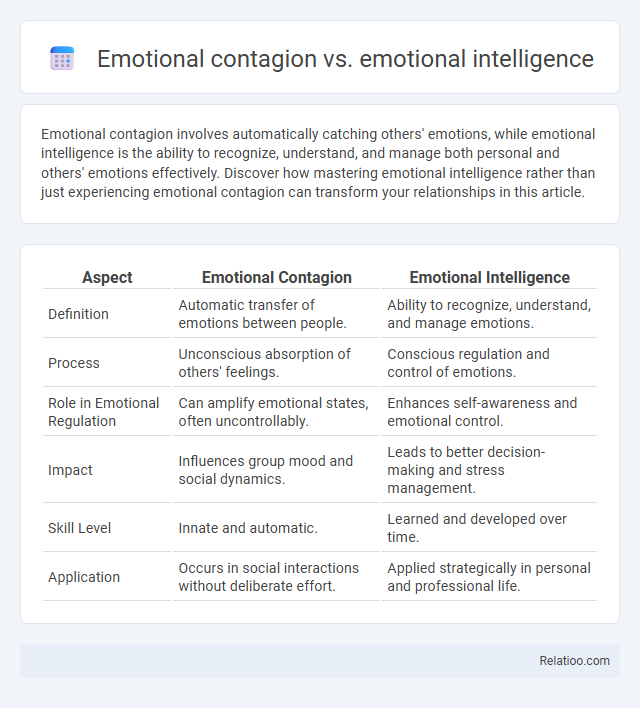Emotional contagion involves automatically catching others' emotions, while emotional intelligence is the ability to recognize, understand, and manage both personal and others' emotions effectively. Discover how mastering emotional intelligence rather than just experiencing emotional contagion can transform your relationships in this article.
Table of Comparison
| Aspect | Emotional Contagion | Emotional Intelligence |
|---|---|---|
| Definition | Automatic transfer of emotions between people. | Ability to recognize, understand, and manage emotions. |
| Process | Unconscious absorption of others' feelings. | Conscious regulation and control of emotions. |
| Role in Emotional Regulation | Can amplify emotional states, often uncontrollably. | Enhances self-awareness and emotional control. |
| Impact | Influences group mood and social dynamics. | Leads to better decision-making and stress management. |
| Skill Level | Innate and automatic. | Learned and developed over time. |
| Application | Occurs in social interactions without deliberate effort. | Applied strategically in personal and professional life. |
Understanding Emotional Contagion
Emotional contagion is the automatic spread of emotions from one individual to another through nonverbal cues like facial expressions and tone of voice, playing a critical role in social interactions and group dynamics. Unlike emotional intelligence, which involves recognizing, understanding, and managing one's own and others' emotions consciously, emotional contagion operates more subconsciously and rapidly. Understanding emotional contagion helps improve empathy and communication by recognizing how emotions are transmitted and influence behavior within teams and relationships.
Defining Emotional Intelligence
Emotional intelligence refers to your ability to recognize, understand, and manage your own emotions while also perceiving and influencing the emotions of others effectively. Unlike emotional contagion, which involves the automatic spread of emotions from one person to another, emotional intelligence requires conscious awareness and regulation of feelings. Developing high emotional intelligence enhances interpersonal communication, decision-making, and conflict resolution skills by balancing emotional awareness with thoughtful responses.
Key Differences Between Emotional Contagion and Emotional Intelligence
Emotional contagion involves automatically mirroring and adopting others' emotions, often unconsciously, while emotional intelligence encompasses the conscious ability to recognize, understand, and manage both personal emotions and those of others. Key differences include emotional contagion's passive, involuntary nature versus emotional intelligence's active, deliberate regulation and awareness. Emotional intelligence enables individuals to respond adaptively to emotions rather than simply absorbing them, fostering improved interpersonal relationships and emotional resilience.
Mechanisms Behind Emotional Contagion
Emotional contagion operates through automatic, unconscious processes such as mimicry and synchronization of facial expressions, vocal tones, and body language, facilitating the spread of emotions between individuals. Emotional intelligence involves the conscious recognition, understanding, and regulation of these emotional transfers to manage one's own and others' feelings effectively. Unlike emotional contagion and emotional intelligence, which focus on emotional transfer and management respectively, the mechanisms behind emotional contagion specifically highlight neural and physiological pathways that enable individuals to intuitively resonate with others' emotional states.
Core Components of Emotional Intelligence
Emotional intelligence comprises core components such as self-awareness, self-regulation, motivation, empathy, and social skills, enabling you to understand and manage both your emotions and those of others effectively. Unlike emotional contagion, which is the automatic transfer of emotions from one person to another, emotional intelligence involves intentional recognition and modulation of emotional responses. Mastery of these core components allows you to harness emotions constructively rather than merely absorbing them passively through emotional contagion.
Impact of Emotional Contagion in Social Settings
Emotional contagion in social settings significantly influences group dynamics by enabling rapid sharing of emotions, which can either elevate collective mood or spread negativity. Your ability to recognize and manage this phenomenon enhances emotional intelligence, allowing you to respond thoughtfully and maintain emotional balance in interactions. Understanding emotional contagion helps improve empathy, communication, and overall social cohesion.
Emotional Intelligence and Personal Success
Emotional intelligence, distinct from emotional contagion, involves the ability to recognize, understand, and regulate one's own emotions as well as empathize with others' feelings, directly influencing personal success by enhancing communication skills, decision-making, and stress management. Emotional contagion refers to the automatic mimicry and synchronization of emotional expressions, which can impact group dynamics but lacks the conscious regulation found in emotional intelligence. Developing emotional intelligence leads to improved interpersonal relationships and resilience, critical factors for achieving long-term personal and professional success.
Emotional Contagion in the Workplace
Emotional contagion in the workplace refers to the unconscious transfer of emotions from one employee to another, significantly impacting team morale and productivity. Unlike emotional intelligence, which involves the conscious ability to recognize and manage emotions in yourself and others, emotional contagion happens automatically, influencing your emotional state through shared experiences and nonverbal cues. Understanding emotional contagion helps you create a positive work environment by fostering empathy and emotional awareness among colleagues.
Cultivating Emotional Intelligence Skills
Cultivating emotional intelligence skills involves developing self-awareness, empathy, and effective emotional regulation, which differentiate it from emotional contagion--the automatic spread of emotions between individuals without conscious control. Unlike emotional contagion, emotional intelligence enables deliberate management of one's emotions and responses, fostering healthier interpersonal interactions and decision-making. Mastering these skills enhances emotional resilience and communication, reducing the negative effects of uncontrolled emotional contagion in social and professional settings.
Managing Emotional Contagion for Better Emotional Health
Managing emotional contagion is crucial for maintaining better emotional health, as it involves recognizing and regulating how others' emotions influence your own feelings and behaviors. Emotional intelligence enhances this process by equipping you with skills to identify, understand, and manage both your emotions and those of others, reducing negative emotional spillover. By consciously controlling emotional contagion through emotional intelligence, you create healthier interpersonal dynamics and improve your overall well-being.

Infographic: Emotional contagion vs Emotional intelligence
 relatioo.com
relatioo.com